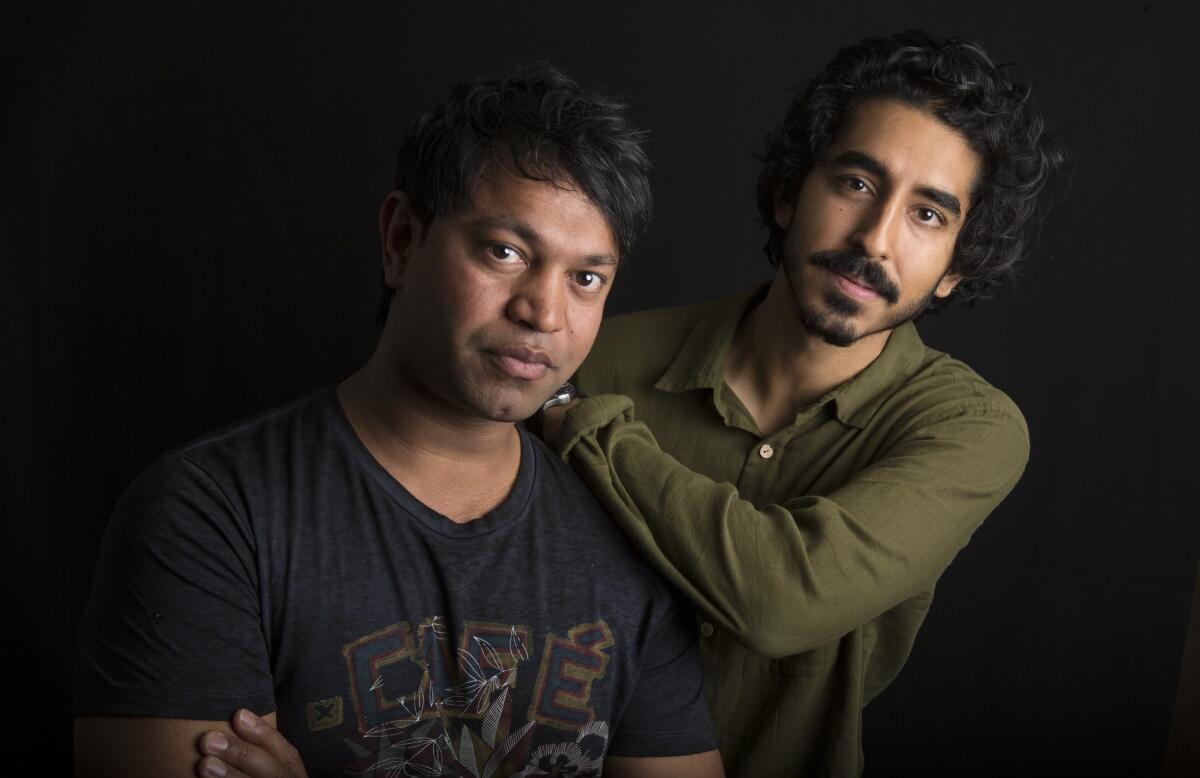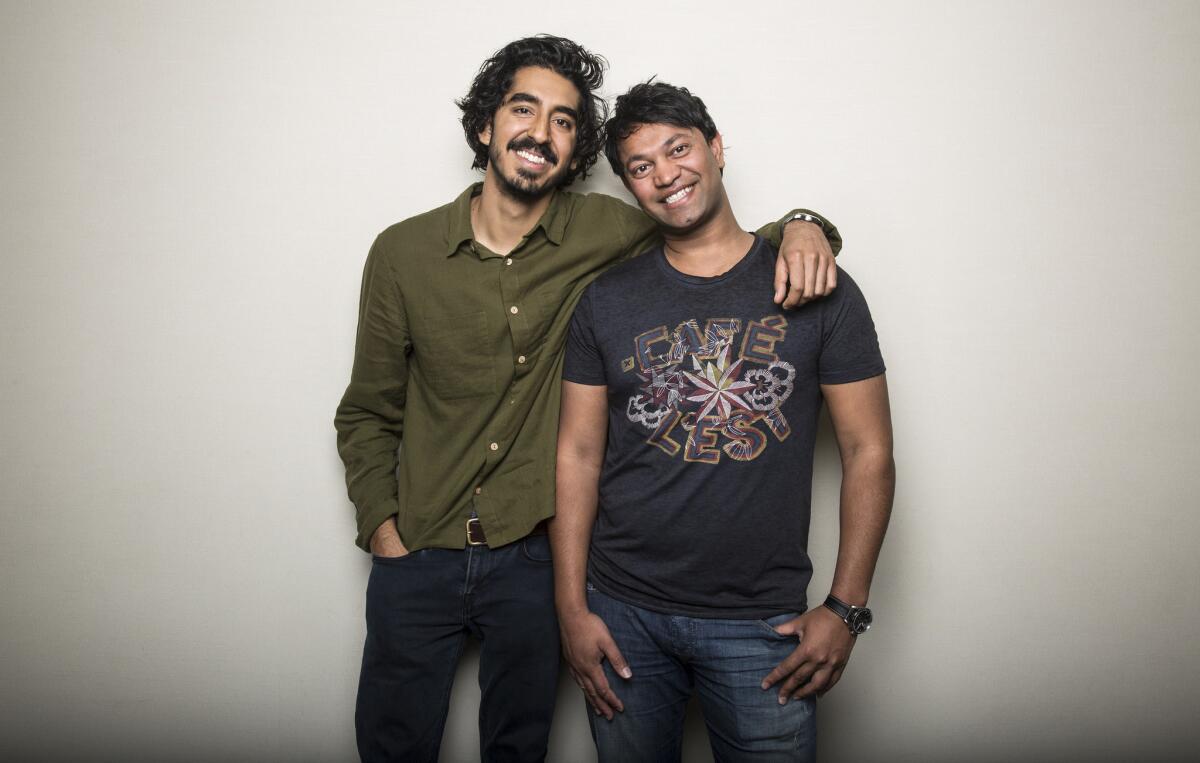Dev Patel and the real familial investigator at the heart of ‘Lion’

- Share via
You’d never know from looking at him, all the things he’s seen. With his mall brand T-shirt and jeans, athletic build and perma-grin, Saroo Brierley seems like your average Australian dude — the kind who drives a sports car and loves watching cricket.
But when he was 5 years old, Brierley’s life took a dramatic turn. He was born in a poverty-stricken Indian village, where he and his siblings spent their days begging for food and searching for fallen coins. One night, while scouring a local train station for change, he got separated from his older brother and accidentally got on a train that took him from his hometown in Khandwa to the overpopulated Kolkata — a journey over 900 miles.
After a harrowing few days alone in the slums of Kolkata, Brierley was picked up by authorities — but he was so young he didn’t even know where he’d come from. So he ended up in an orphanage, where he was soon adopted by a well-off Australian couple. That’s how he got to Hobart, the affluent seaside capital of Tasmania and the place he’s called home ever since he was 5.
If his story had stopped there, it would have been miraculous enough. But as the new movie about his life, “Lion,” depicts, Brierley’s life continued along an even more astounding path. Because when he got to college, he decided to start looking for his long-lost Indian family using satellite images on Google Earth — even though he had only the fuzzy, two-decade-old memories of a child to guide him.

Rooney Mara, Dev Patel and Nicole Kidman star in “Lion.”
Dev Patel, the British actor, knew how it felt to question your identity. Growing up in London, he tried to play down his Indian roots for fear of being bullied. It was only when he traveled to India for the first time at age 17 to film “Slumdog Millionaire” that he started to connect with his ancestral homeland.
“And I think that’s why I connected to Saroo’s story so much, because when you hear him talk — down to the cricket team he supports — he’s an Aussie through and through,” said Patel, who plays the adult version of Brierley in “Lion.” “But when you read the script, there’s two Saroos. There’s this Indian boy with the torn clothes, and then all of a sudden you see this guy going out and he’s dating girls and listening to London Grammar and driving his 350Z. It’s such growth for a human being that it’s almost like they’re two different people.”
“It boggles my mind when I think about it,” Brierley agreed. “That a child can go through such trial and tribulations and come out of it not psychologically scarred.”
Patel, 26, and Brierley, 35, had met in Hollywood a few weeks ago to share some green tea before a week of promotional activities for “Lion.” The Weinstein Co., which is releasing the film in L.A. and New York on Friday, flew Brierley the 15 hours from Australia so that he could attend a slew of awards-season parties and red carpet premieres. On his first night in town, Brierley went to the Hamilton Awards, an event honoring behind-the-camera artists, where he was seated next to Patel. It was only the second time the two men had met. The following morning, here they were, Brierley still rubbing the jet lag out of his eyes.
“It’s weird, because I feel like he’s still starting to get to know me because we haven’t spent that much time together,” Patel said. “There’s so much to catch up on. I feel like I know him so intricately because I tried to live his life for a year. I don’t know how to explain it. But I feel like I know you, and I’ve known you, for a long time.”
Patel became interested in playing Brierley before a script for “Lion” had even been written. The actor read about Brierley in the news a few years ago and immediately began “properly YouTube stalking” him, watching some of the inspirational talks he’d delivered about his journey. So when word began circulating around town that Brierley’s story was being adapted for a movie, Patel asked his agents to set up a meeting with the filmmakers.
You think you’re desensitized because it’s your story, but you’re not. Things that you’ve ... let go of ... they still sort of come back.
— Saroo Brierly, the subject of “Lion
Patel wound up at screenwriter Luke Davies’ home in Koreatown. “He and Garth [Davis, the director] are still storyboarding the first act on a whiteboard,” Patel recalled. “I was trying to avert my eyes because it was classified information. It was so premature that I felt very embarrassed. So I had some ginger tea, said hello and then left very awkwardly. They were like, ‘You’re a sweet guy, but listen, we don’t have a script and you’re going to have to audition.’”
He did have to audition — it was a tryout that lasted six hours. After he finally landed the part, Davis laid out a few conditions. He was going to have to put on some weight to look more like a “sporting Australian,” the filmmaker said. And he really needed to nail the accent.
“I just wanted to shake people’s preconceptions of Dev Patel,” explained the director. “A lot of people come to the movie with ‘The Best Exotic Marigold Hotel’ in mind — that Dev that makes everyone laugh. I just didn’t want that luggage. I wanted people to see him in this role and be compelled by that.”
Patel met Brierley once during production — at a barbecue in Hobart last April.
“You drove me to the barbecue — and he drives really fast, as well. Terrifyingly fast. I was holding on for my life,” Patel said with a laugh.
“Well, Dev said, ‘How fast does your 350 Zed go?’ And he just gave me permission to put the pedal down,” Brierley said.
Meanwhile, Brierley was still reckoning with how he felt while watching his story be turned into a film. He largely stayed offset but did travel to West Bengal to watch a scene being filmed on the Howrah Bridge — where he bathed in polluted water when he was lost as a boy in Kolkata.
“Funny enough, I was OK,” Brierley said, referring to watching 8-year-old newcomer Sunny Pawar portray him. “I just wanted to make sure everyone else was all right.”
“Is that scary for you, when it takes on a life of its own, in a way?” Patel asked.
“Um, not really,” Brierley replied. “Well, when I was there, I was OK. But when I watched the movie, it was totally different. You think you’re desensitized because it’s your story, but you’re not really. Things that you’ve diffused and let go of off the weight of your shoulders — they still sort of come back. When we finished watching the movie, my mum and dad and I just huddled together and fell into tears.”
Brierley is extremely close to his adoptive parents — he’s worked for his father John’s marine supply store and has spent most of the Q&A sessions after “Lion” screenings clutching his mother Sue’s hand.
“His adopted parents gave him this good love that was so nourishing,” said Nicole Kidman, who plays Sue in the film. “She’s devoted to him, Sue. He still lives with her. I think it’s a really interesting thing to tell people, because it shows you how connected they are. I think their bond is incredibly strong. You can’t sever it, actually.”
The process of making “Lion” has been emotional for Patel too. After the success of “Slumdog” in 2008, the actor said he struggled to get “substantial work” as a young British Asian actor — starring in M. Night Shyamalan’s critically maligned “The Last Airbender” and turning to television for a supporting role on HBO’s “The Newsroom.” So he saw “Lion” as a “real shooting star,” and told his manager not to send him any work or distract him whatsoever during the eight months he spent getting into Brierley’s head.
“I feel like I’ve really grown in the process,” said Patel. “It’s allowed me to be in a space that no one’s seen me in — a performance place of stillness, of maturity, of pain. It was a really heavy filming process for me, but it emotionally opened me up. It made me a more conscious human being.”

He picked up a copy of Brierley’s memoir, “A Long Way Home,” which was resting on the table and stared at the cover image of Brierley as a wide-eyed boy — a photo taken just after he’d met his adoptive parents.
“When I’m in anxiety or stress about things, I always look towards little Saroo — that little lion that can conquer anything,” Brierley said. “Look what he’s been through. How would he feel? He would have been thick-skinned — no emotions can override him.”
“Wow,” Patel said, letting out a heavy sigh. “That’s beautiful. I mean, you sit here with Saroo and I can say looking at him, he’s a genuine inspiration. Everyone goes through their small anxieties, and you look at small Saroo and he is a feat of survival, adaptability — someone who just can follow their instincts. And that’s beautiful. And I look at the adult Saroo, who I tried to live for over a year of my life, and I think: There’s a man who did the exact same thing. He had these feelings that were gestating in him for so long that he tried to suppress and then one day he decided to face it.”
He paused, and then: “What I’m trying to say to you, I guess, is don’t be so tough on yourself. You’re a winner as a small Saroo and the Saroo that I see before me. Sorry, I just wanted to say that. We split it up, but that’s you through and through. You’re both. That’s what I’m saying. That’s you.”
Brierley smiled awkwardly, trying to take the compliment. The men got up and shared a quick hug. They exchanged phone numbers for the first time and walked to the lobby to await their rides. A black Town Car arrived for Brierley.
“Man, check you out!” Patel said, nodding toward the chauffeur. “See you for dinner, yeah?”
Follow me on Twitter @AmyKinLA
More to Read
Only good movies
Get the Indie Focus newsletter, Mark Olsen's weekly guide to the world of cinema.
You may occasionally receive promotional content from the Los Angeles Times.











